外研版(2019) 必修第三册 Unit 3 The world of Science Using Language课件(31张)
文档属性
| 名称 | 外研版(2019) 必修第三册 Unit 3 The world of Science Using Language课件(31张) | 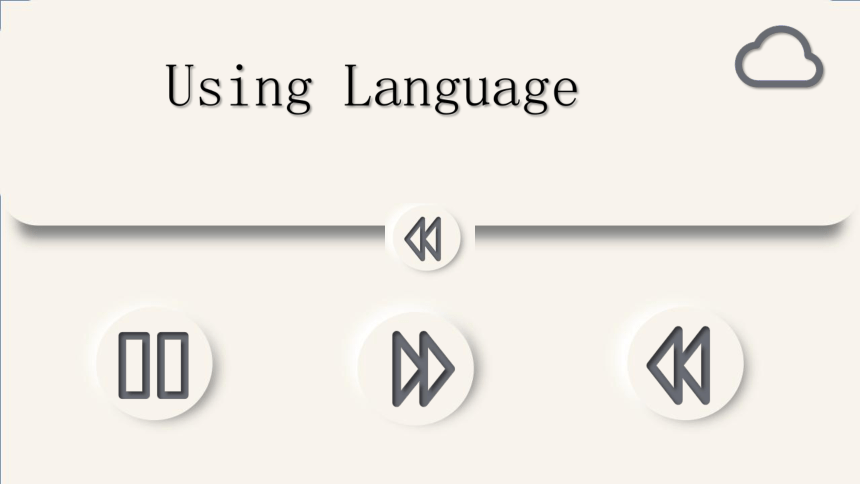 | |
| 格式 | zip | ||
| 文件大小 | 12.9MB | ||
| 资源类型 | 教案 | ||
| 版本资源 | 外研版(2019) | ||
| 科目 | 英语 | ||
| 更新时间 | 2022-06-02 10:36:16 | ||
图片预览

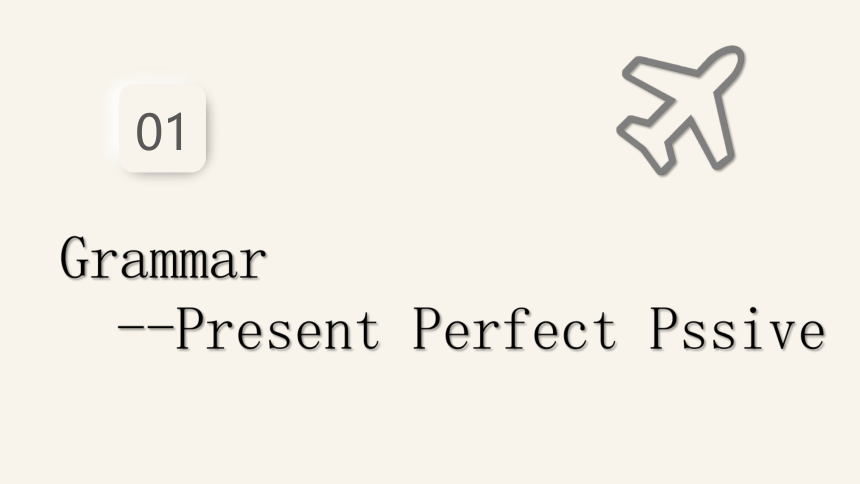
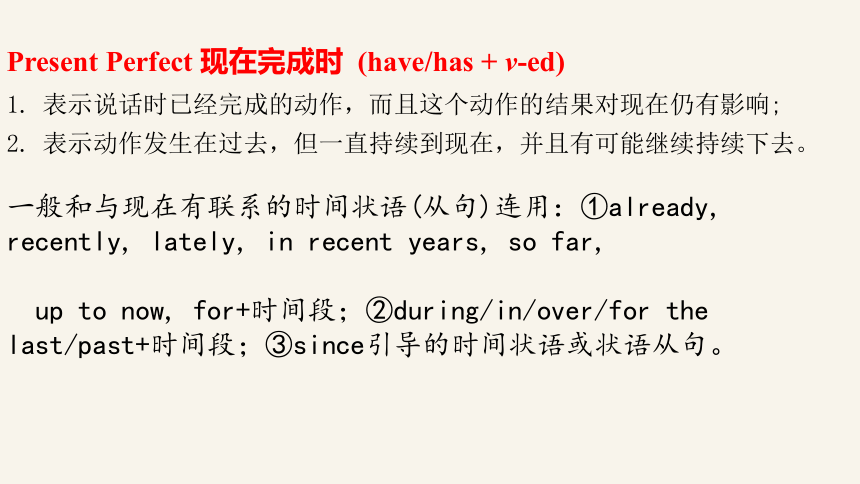
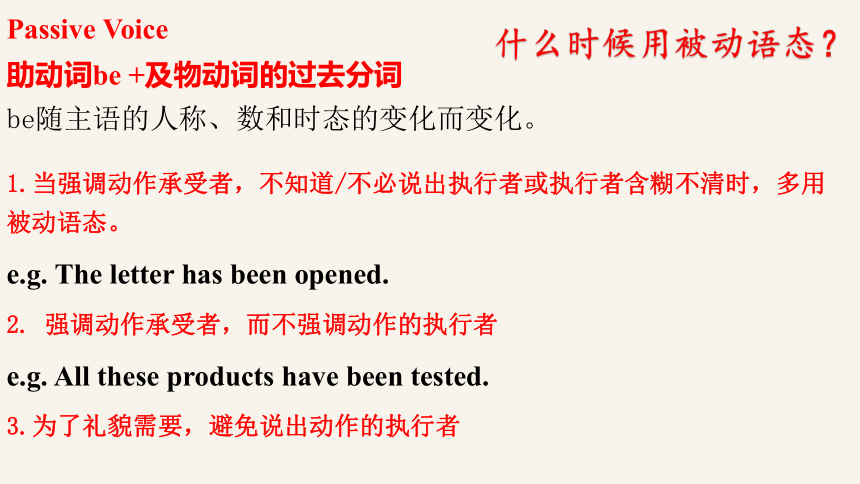
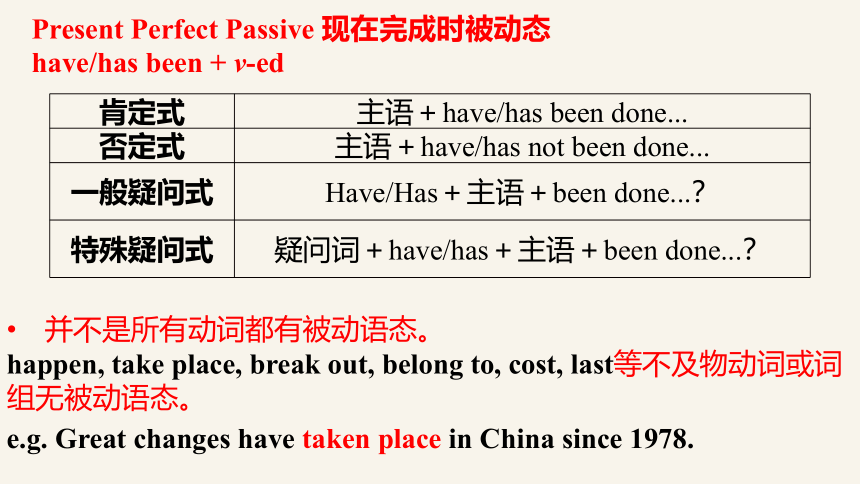
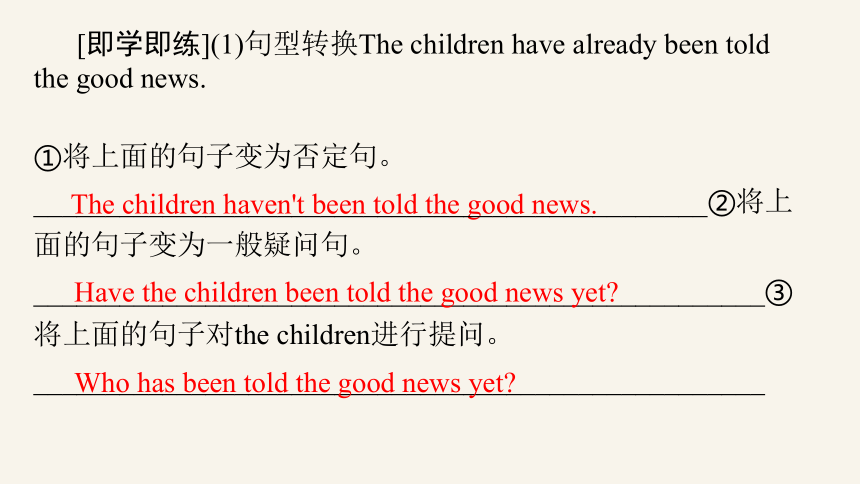
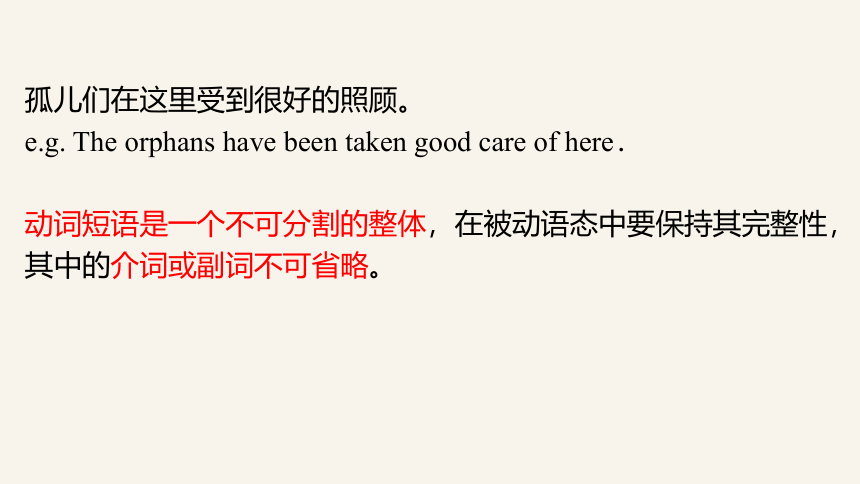
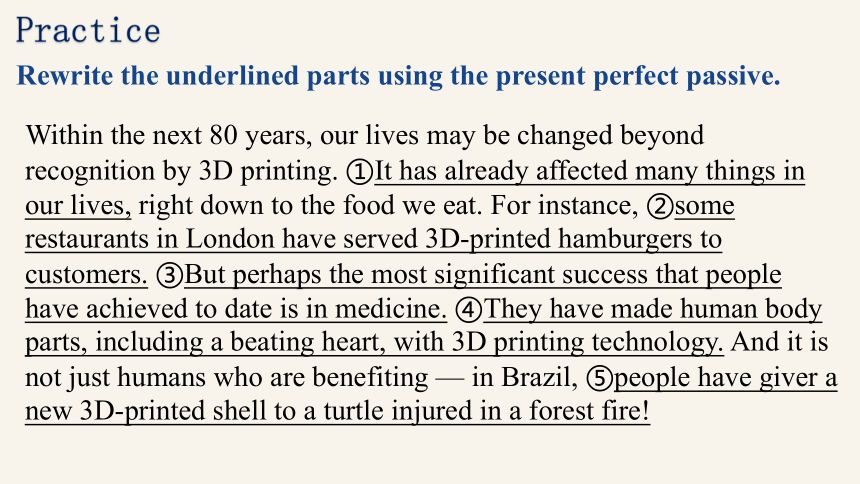
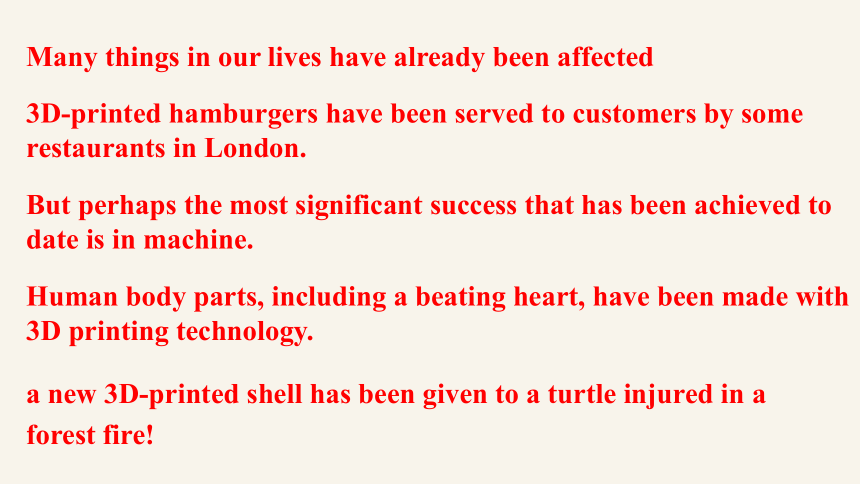
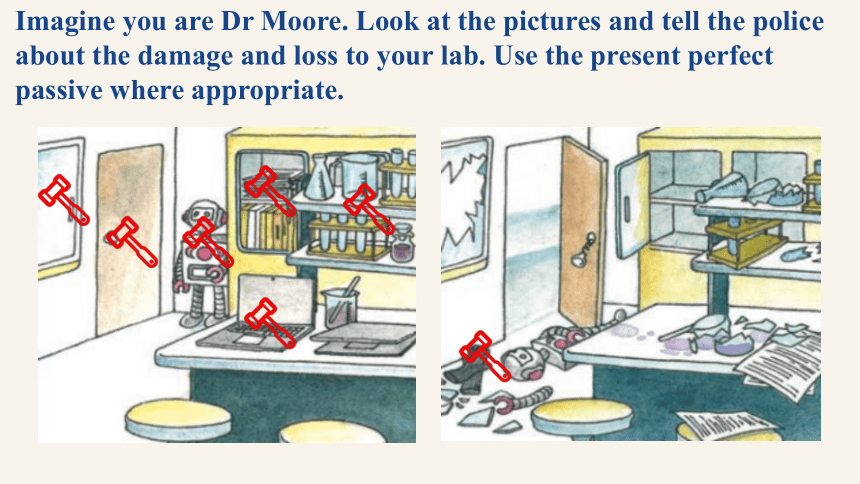
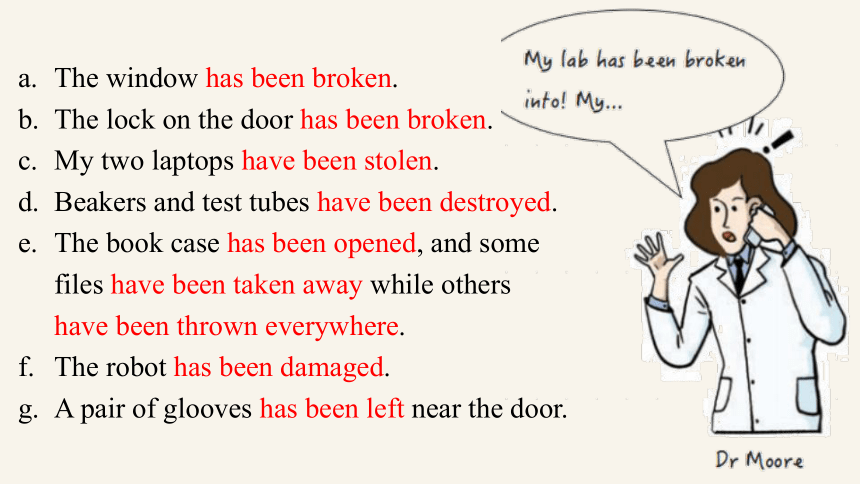
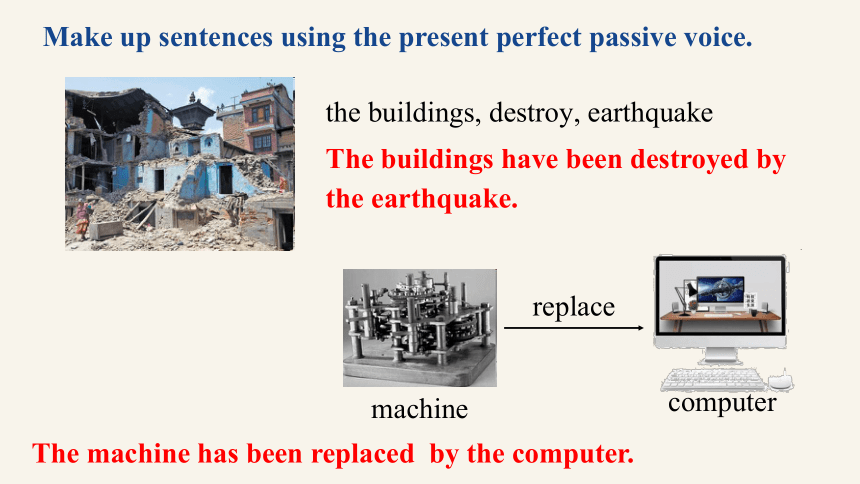
文档简介
(共31张PPT)
Using Language
01
Grammar
--Present Perfect Pssive
Present Perfect 现在完成时 (have/has + v-ed)
表示说话时已经完成的动作,而且这个动作的结果对现在仍有影响;
表示动作发生在过去,但一直持续到现在,并且有可能继续持续下去。
一般和与现在有联系的时间状语(从句)连用:①already, recently, lately, in recent years, so far,
up to now, for+时间段;②during/in/over/for the last/past+时间段;③since引导的时间状语或状语从句。
Passive Voice
助动词be +及物动词的过去分词
be随主语的人称、数和时态的变化而变化。
什么时候用被动语态?
1.当强调动作承受者,不知道/不必说出执行者或执行者含糊不清时,多用被动语态。
e.g. The letter has been opened.
2. 强调动作承受者,而不强调动作的执行者
e.g. All these products have been tested.
3.为了礼貌需要,避免说出动作的执行者
肯定式 主语+have/has been done...
否定式 主语+have/has not been done...
一般疑问式 Have/Has+主语+been done...?
特殊疑问式 疑问词+have/has+主语+been done...?
Present Perfect Passive 现在完成时被动态
have/has been + v-ed
并不是所有动词都有被动语态。
happen, take place, break out, belong to, cost, last等不及物动词或词组无被动语态。
e.g. Great changes have taken place in China since 1978.
The children haven't been told the good news.
[即学即练](1)句型转换The children have already been told the good news.
①将上面的句子变为否定句。_______________________________________________②将上面的句子变为一般疑问句。 ___________________________________________________③将上面的句子对the children进行提问。___________________________________________________
Have the children been told the good news yet
Who has been told the good news yet
孤儿们在这里受到很好的照顾。
e.g. The orphans have been taken good care of here.
动词短语是一个不可分割的整体,在被动语态中要保持其完整性,其中的介词或副词不可省略。
Within the next 80 years, our lives may be changed beyond recognition by 3D printing. ①It has already affected many things in our lives, right down to the food we eat. For instance, ②some restaurants in London have served 3D-printed hamburgers to customers. ③But perhaps the most significant success that people have achieved to date is in medicine. ④They have made human body parts, including a beating heart, with 3D printing technology. And it is not just humans who are benefiting — in Brazil, ⑤people have giver a new 3D-printed shell to a turtle injured in a forest fire!
Practice
Rewrite the underlined parts using the present perfect passive.
Many things in our lives have already been affected
3D-printed hamburgers have been served to customers by some restaurants in London.
But perhaps the most significant success that has been achieved to date is in machine.
Human body parts, including a beating heart, have been made with 3D printing technology.
a new 3D-printed shell has been given to a turtle injured in a forest fire!
Imagine you are Dr Moore. Look at the pictures and tell the police about the damage and loss to your lab. Use the present perfect passive where appropriate.
The window has been broken.
The lock on the door has been broken.
My two laptops have been stolen.
Beakers and test tubes have been destroyed.
The book case has been opened, and some files have been taken away while others have been thrown everywhere.
The robot has been damaged.
A pair of glooves has been left near the door.
The buildings have been destroyed by the earthquake.
the buildings, destroy, earthquake
Make up sentences using the present perfect passive voice.
replace
The machine has been replaced by the computer.
computer
machine
【附】现在完成进行时:1. 结构:have/has been doing2. 概念:现在完成进行时表示从过去某时开始一直持续到现在的动作,并且还将持续下去。现在完成进行时强调的是动作的过程及持续性,可用来解释某一现象。e.g. I have been learning English since three years ago.e.g. We are very tired. We’ve been cleaning the house.
现在完成时 现在完成进行时
表示动作已经完成 表示动作在迄今为止的一段时间被曾持续进行或目前仍在持续
强调动作的结果 强调动作持续进行的状态
02
Vocabulary
--Careers in science
What are the corresponding subjects
physics, mathematics, chemistry,astronomer,
geography, biology
Please complete the introductions.
astronomer
biologist
geographer
chemist
physicist
mathematician
journalist 新闻记者 lawyer 律师
accountant 会计 dentist牙医
librarian图书管理员 surgeon 外科医生
pharmacist药剂师 anesthetist 麻醉师
governor政府官员 stewardess 空中服务员
secretary 秘书 headmaster 校长
manager 经理 pilot 飞行员
Work in pairs.
Think about other careers in science and discuss what interest you most.
03
Listening & Speaking
-- Invention Stories
How much do you know about Alzheimer’s disease
Alzheimer’s disease
symptoms:
sleeping issue
disturbed memory
mood disorder
increasing confusion
dementia 痴呆
1.Number the picture in the correct order.
2.Listen to the material and check your prediction.
Invention Stories
1.Number the picture in the correct order.
2.Listen to the material and check your prediction.
Invention Stories
c
b
d
a
e
1. a pair of socks designed for people with Alzheimer’s disease
2. a student form New York
3. His grandfather
4. A warning
5. gets out of bed
Mike: Hey, look! I’ve read about a cool invention in this magazine!
Anna: A pair of socks
Mike: Yes, but they're not ordinary socks. This is a product designed for people with Alzheimer's disease.
Anna: Oh yes, I saw a TV show about that. It was invented by a student from New York called Kenneth. He even won an award for it at a science fair!
Mike: Wow! How did he come up with the idea
Anna: Well, his grandfather has Alzheimer's. He forgets things and gets lost easily. Once he got lost in the city and it took a whole day to find him! The family was always worrying about him leaving the house and had to keep an eye on him ----even at night! Kenneth had been trying to find a solution. Then one night, he was looking after his grandfather and saw him get out of bed and step on the floor. That moment inspired him, and a good idea came to his mind.
Mike: I didn't know that! How did that moment inspire him
Anna: Well, it made him think of putting a device into a pair of socks to sense pressure. He started by drawing his ideas, and then he thought about how to power the device. Eventually, he created a device the size of a coin!
Mike: Like a coin So how does it work
Anna: He got his grandfather to wear the socks. When his feet touched the floor, the device sensed an increase of pressure, and a warning was sent to the boy's mobile phone ---- like an alarm. That way, he could know his grandfather was getting out of bed without staying up all night.
Mike: How amazing! What a useful invention and caring grandson!
Anna: Yes, you are quite right.
Exclamatory sentences express strong emotions, such as surprise, shock, joy, emphasis and excitement. These are usually formed with what or how, and in written form usually end with an exclamation mark.
You are going to give a presentation about the invention of the telephone. As part of your research, you speak to Student B who has just read a book about it. Ask him/her questions to find out more information.
Student A
You've just read a book about the invention of the telephone.
Student A, who is going to give a presentation on the same topic, asks
you for information.
Student B
Work in pairs.
Act out the conversation about the invention of the telephone.
Information you’d like to know:
the inventor
year of invention
the inventing process
the first phone call
other interesting things about the invention
Student A
Who invented..
When was… invented
How was … invented
What was the first phone call about
What other interesting things…
Useful expressions
Student B
Inventor: Alexander Graham Bell
Invention created in: 1876
Background: Bell was a teacher at a school for the deaf. He tried to invent a machine to send messages over an electronic wire. This eventually led to the idea of a telephone. Later, with his assistant, he created a device to produce and receive sound waves using electrical signals.
First phone call: On 10 March 1876, Bell made the first clear and complete phone call to his assistant, saying, “Mr Watson- come here-I want to see you.”
Other information: Bell never had a telephone in his study, where he wanted to be alone with his thoughts and work.
The telephone was invented by… in…
When…he…
He later… and finally…
The first phone call was about…
It is interesting that…
Useful expressions
Homework
Using Language
01
Grammar
--Present Perfect Pssive
Present Perfect 现在完成时 (have/has + v-ed)
表示说话时已经完成的动作,而且这个动作的结果对现在仍有影响;
表示动作发生在过去,但一直持续到现在,并且有可能继续持续下去。
一般和与现在有联系的时间状语(从句)连用:①already, recently, lately, in recent years, so far,
up to now, for+时间段;②during/in/over/for the last/past+时间段;③since引导的时间状语或状语从句。
Passive Voice
助动词be +及物动词的过去分词
be随主语的人称、数和时态的变化而变化。
什么时候用被动语态?
1.当强调动作承受者,不知道/不必说出执行者或执行者含糊不清时,多用被动语态。
e.g. The letter has been opened.
2. 强调动作承受者,而不强调动作的执行者
e.g. All these products have been tested.
3.为了礼貌需要,避免说出动作的执行者
肯定式 主语+have/has been done...
否定式 主语+have/has not been done...
一般疑问式 Have/Has+主语+been done...?
特殊疑问式 疑问词+have/has+主语+been done...?
Present Perfect Passive 现在完成时被动态
have/has been + v-ed
并不是所有动词都有被动语态。
happen, take place, break out, belong to, cost, last等不及物动词或词组无被动语态。
e.g. Great changes have taken place in China since 1978.
The children haven't been told the good news.
[即学即练](1)句型转换The children have already been told the good news.
①将上面的句子变为否定句。_______________________________________________②将上面的句子变为一般疑问句。 ___________________________________________________③将上面的句子对the children进行提问。___________________________________________________
Have the children been told the good news yet
Who has been told the good news yet
孤儿们在这里受到很好的照顾。
e.g. The orphans have been taken good care of here.
动词短语是一个不可分割的整体,在被动语态中要保持其完整性,其中的介词或副词不可省略。
Within the next 80 years, our lives may be changed beyond recognition by 3D printing. ①It has already affected many things in our lives, right down to the food we eat. For instance, ②some restaurants in London have served 3D-printed hamburgers to customers. ③But perhaps the most significant success that people have achieved to date is in medicine. ④They have made human body parts, including a beating heart, with 3D printing technology. And it is not just humans who are benefiting — in Brazil, ⑤people have giver a new 3D-printed shell to a turtle injured in a forest fire!
Practice
Rewrite the underlined parts using the present perfect passive.
Many things in our lives have already been affected
3D-printed hamburgers have been served to customers by some restaurants in London.
But perhaps the most significant success that has been achieved to date is in machine.
Human body parts, including a beating heart, have been made with 3D printing technology.
a new 3D-printed shell has been given to a turtle injured in a forest fire!
Imagine you are Dr Moore. Look at the pictures and tell the police about the damage and loss to your lab. Use the present perfect passive where appropriate.
The window has been broken.
The lock on the door has been broken.
My two laptops have been stolen.
Beakers and test tubes have been destroyed.
The book case has been opened, and some files have been taken away while others have been thrown everywhere.
The robot has been damaged.
A pair of glooves has been left near the door.
The buildings have been destroyed by the earthquake.
the buildings, destroy, earthquake
Make up sentences using the present perfect passive voice.
replace
The machine has been replaced by the computer.
computer
machine
【附】现在完成进行时:1. 结构:have/has been doing2. 概念:现在完成进行时表示从过去某时开始一直持续到现在的动作,并且还将持续下去。现在完成进行时强调的是动作的过程及持续性,可用来解释某一现象。e.g. I have been learning English since three years ago.e.g. We are very tired. We’ve been cleaning the house.
现在完成时 现在完成进行时
表示动作已经完成 表示动作在迄今为止的一段时间被曾持续进行或目前仍在持续
强调动作的结果 强调动作持续进行的状态
02
Vocabulary
--Careers in science
What are the corresponding subjects
physics, mathematics, chemistry,astronomer,
geography, biology
Please complete the introductions.
astronomer
biologist
geographer
chemist
physicist
mathematician
journalist 新闻记者 lawyer 律师
accountant 会计 dentist牙医
librarian图书管理员 surgeon 外科医生
pharmacist药剂师 anesthetist 麻醉师
governor政府官员 stewardess 空中服务员
secretary 秘书 headmaster 校长
manager 经理 pilot 飞行员
Work in pairs.
Think about other careers in science and discuss what interest you most.
03
Listening & Speaking
-- Invention Stories
How much do you know about Alzheimer’s disease
Alzheimer’s disease
symptoms:
sleeping issue
disturbed memory
mood disorder
increasing confusion
dementia 痴呆
1.Number the picture in the correct order.
2.Listen to the material and check your prediction.
Invention Stories
1.Number the picture in the correct order.
2.Listen to the material and check your prediction.
Invention Stories
c
b
d
a
e
1. a pair of socks designed for people with Alzheimer’s disease
2. a student form New York
3. His grandfather
4. A warning
5. gets out of bed
Mike: Hey, look! I’ve read about a cool invention in this magazine!
Anna: A pair of socks
Mike: Yes, but they're not ordinary socks. This is a product designed for people with Alzheimer's disease.
Anna: Oh yes, I saw a TV show about that. It was invented by a student from New York called Kenneth. He even won an award for it at a science fair!
Mike: Wow! How did he come up with the idea
Anna: Well, his grandfather has Alzheimer's. He forgets things and gets lost easily. Once he got lost in the city and it took a whole day to find him! The family was always worrying about him leaving the house and had to keep an eye on him ----even at night! Kenneth had been trying to find a solution. Then one night, he was looking after his grandfather and saw him get out of bed and step on the floor. That moment inspired him, and a good idea came to his mind.
Mike: I didn't know that! How did that moment inspire him
Anna: Well, it made him think of putting a device into a pair of socks to sense pressure. He started by drawing his ideas, and then he thought about how to power the device. Eventually, he created a device the size of a coin!
Mike: Like a coin So how does it work
Anna: He got his grandfather to wear the socks. When his feet touched the floor, the device sensed an increase of pressure, and a warning was sent to the boy's mobile phone ---- like an alarm. That way, he could know his grandfather was getting out of bed without staying up all night.
Mike: How amazing! What a useful invention and caring grandson!
Anna: Yes, you are quite right.
Exclamatory sentences express strong emotions, such as surprise, shock, joy, emphasis and excitement. These are usually formed with what or how, and in written form usually end with an exclamation mark.
You are going to give a presentation about the invention of the telephone. As part of your research, you speak to Student B who has just read a book about it. Ask him/her questions to find out more information.
Student A
You've just read a book about the invention of the telephone.
Student A, who is going to give a presentation on the same topic, asks
you for information.
Student B
Work in pairs.
Act out the conversation about the invention of the telephone.
Information you’d like to know:
the inventor
year of invention
the inventing process
the first phone call
other interesting things about the invention
Student A
Who invented..
When was… invented
How was … invented
What was the first phone call about
What other interesting things…
Useful expressions
Student B
Inventor: Alexander Graham Bell
Invention created in: 1876
Background: Bell was a teacher at a school for the deaf. He tried to invent a machine to send messages over an electronic wire. This eventually led to the idea of a telephone. Later, with his assistant, he created a device to produce and receive sound waves using electrical signals.
First phone call: On 10 March 1876, Bell made the first clear and complete phone call to his assistant, saying, “Mr Watson- come here-I want to see you.”
Other information: Bell never had a telephone in his study, where he wanted to be alone with his thoughts and work.
The telephone was invented by… in…
When…he…
He later… and finally…
The first phone call was about…
It is interesting that…
Useful expressions
Homework
